Anxiety can be a challenging and persistent companion in our daily lives. As someone who has grappled with anxiety for years, I’ve uncovered that a simple cup of tea can be a powerful ally in finding moments of calm amidst the chaos.
Let’s explore five exceptional teas that have proven to be effective in soothing anxiety and promoting relaxation.
The Science Behind Calming Teas
Before we dive into our top picks, it’s crucial to understand why certain teas can have such a profound effect on our mental state. Many herbal teas contain compounds that interact with our nervous system, promoting relaxation and reducing stress.
These useful compounds include flavonoids, terpenes, and other bioactive substances that influence neurotransmitters like GABA (gamma-aminobutyric acid). GABA plays a crucial role in regulating anxiety by inhibiting excessive neuronal activity in the brain.
Additionally, the act of preparing and sipping tea can be a mindful practice in itself. This ritual encourages us to slow down, be present in the moment, and focus on the sensory experience of brewing and enjoying our tea.
This combination of chemical and psychological effects makes tea a powerful tool for managing anxiety.
1. Chamomile: The Classic Calmer
Chamomile tea has been a go-to remedy for anxiety and insomnia for centuries. Its gentle, apple-like aroma is instantly soothing, but the benefits extend far beyond its pleasant scent.
Chamomile contains an antioxidant called apigenin, which binds to specific receptors in the brain that may decrease anxiety and start sleep. A study published in the journal Phytomedicine found that patients with generalized anxiety disorder who took chamomile supplements for eight weeks experienced a significant decrease in anxiety symptoms compared to those taking a placebo.
To maximize the benefits of chamomile tea, steep it for at least 5 minutes. This allows the useful compounds to fully infuse into the water.
I find that adding a touch of honey enhances the flavor and provides an extra comforting touch.
Chamomile tea is particularly effective as part of a bedtime routine. The combination of its mild sedative effects and the ritual of preparing and sipping a warm beverage can help signal to your body that it’s time to wind down and prepare for sleep.
For those who are sensitive to caffeine or looking for an evening tea option, chamomile is an excellent choice as it’s naturally caffeine-free. This means you can enjoy it at any time of day without worrying about it interfering with your sleep schedule.
Recommended Product:
Wild & Organic Chamomile – This chamomile supplement is made with only vegan ingredients, free from GMOs, and contains no artificial additives. Each serving of Wild & Organic chamomile tincture contains 500 mg of chamomile extract for relaxation and calmness support.
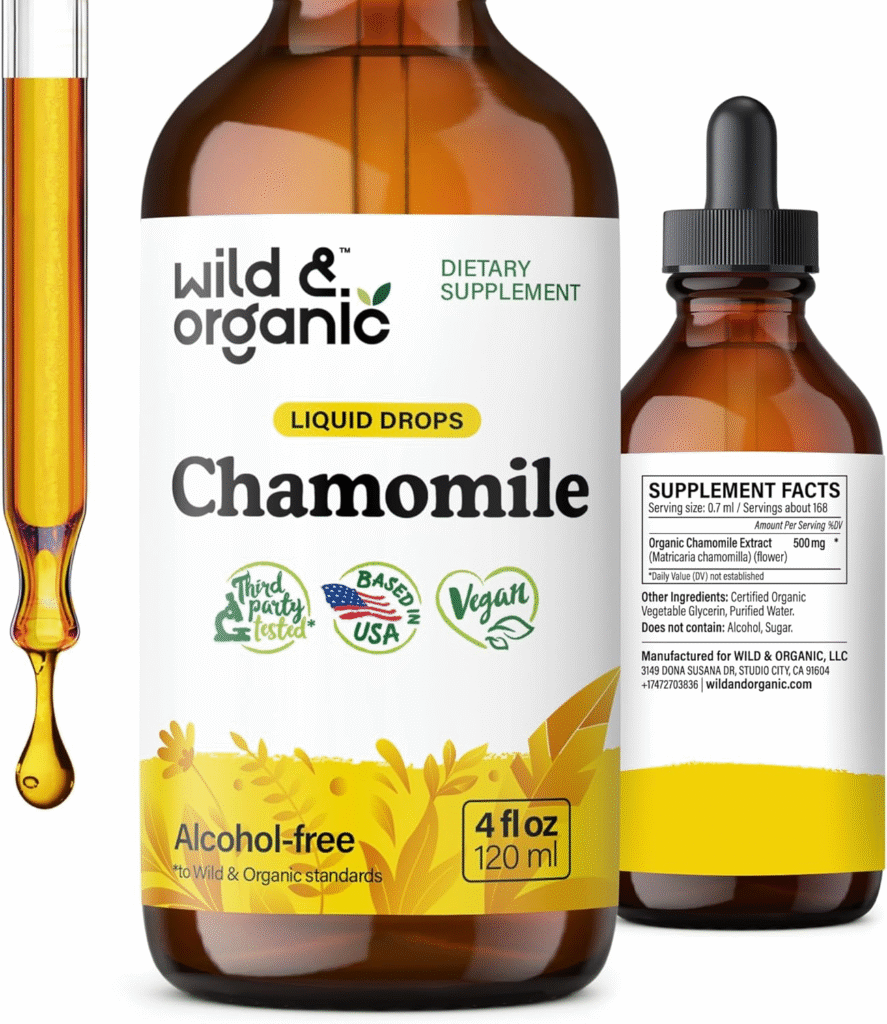
2. Lavender: A Floral Remedy for Relaxation
While lavender is often associated with aromatherapy, it’s also an excellent choice for a calming tea. The scent of lavender alone has been shown to reduce anxiety and improve sleep quality, but drinking it as a tea allows you to benefit from its internal effects as well.
Lavender contains linalool, a compound that has been shown to interact with GABA receptors in a way that produces calming effects similar to anti-anxiety medications, but without the side effects. A study in the journal Phytomedicine found that lavender oil was as effective as lorazepam, a common anti-anxiety medication, in reducing symptoms of generalized anxiety disorder.
When brewing lavender tea, be careful not to oversteep, as it can become bitter. I recommend steeping for 3-4 minutes and pairing it with a light, floral honey to complement its delicate flavor.
The resulting brew is a soothing, aromatic experience that can help calm your mind and ease tension in your body.
Lavender tea can be particularly helpful during times of acute stress or when you’re feeling overwhelmed. The combination of its calming aroma and the act of taking a moment to prepare and enjoy a cup of tea can provide a much-needed break from stressful situations.
For those who find the taste of pure lavender tea too strong, consider trying a blend that combines lavender with other calming herbs like chamomile or lemon balm. These combinations can create a more complex flavor profile while still providing the anxiety-reducing benefits of lavender.
Recommended Product:
Organic Lavender Capsules – These lavender capsules are designed to support a calm mind and relaxed body, making them ideal for encouraging relaxation and overall well-being. Formulated to encourage a calm mind and relaxed body, these capsules support overall well-being and help you unwind naturally after a busy day.
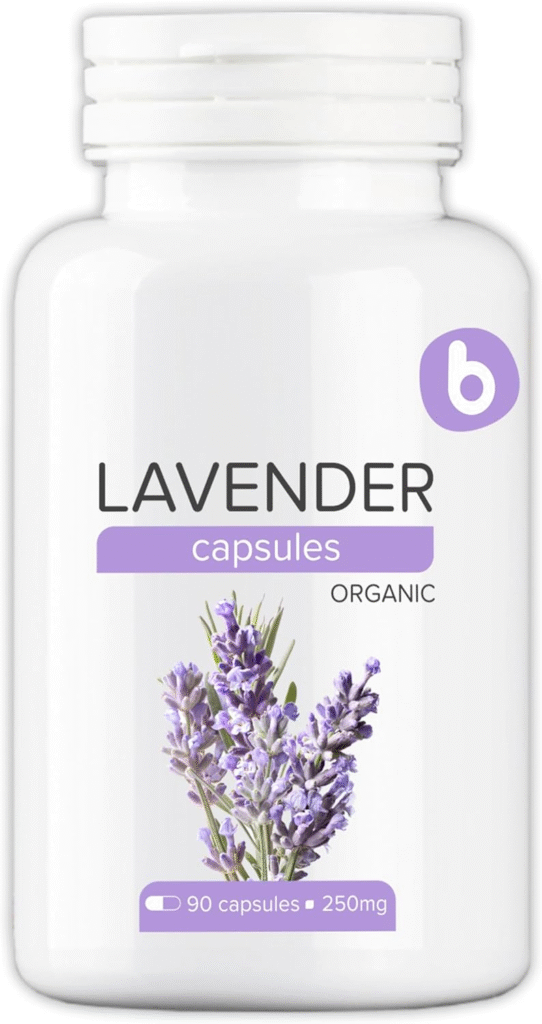
3. Green Tea: L-Theanine for Calm Focus
Green tea might seem like an odd choice for calming anxiety, given its caffeine content. However, it contains a unique amino acid called L-theanine, which has been shown to promote relaxation without drowsiness.
This makes green tea an excellent choice for daytime anxiety relief when you need to stay alert and focused.
Research published in the Journal of Trends in Food Science & Technology suggests that L-theanine increases the production of alpha waves in the brain, which are associated with a state of “wakeful relaxation.” This is the state of mind often achieved through meditation, where you’re deeply relaxed but still alert and focused.
The combination of L-theanine and caffeine in green tea can create a balanced state of calm alertness. While the caffeine provides a gentle energy boost, the L-theanine helps to smooth out any jittery effects, resulting in improved concentration and reduced anxiety.
To maximize the calming effects of green tea, opt for shade-grown varieties like Gyokuro or Matcha, which have higher L-theanine content. These teas are grown under special conditions that increase the production of L-theanine in the tea leaves.
When preparing green tea, use water that’s just under boiling point (around 160-180°F or 70-80°C) and steep for no more than 2-3 minutes to avoid bitterness. This gentle brewing method helps preserve the delicate flavors and useful compounds in the tea.
Green tea can be an excellent addition to your morning routine, providing a calm and focused start to your day. It’s also a great option for mid-afternoon when you need a gentle pick-me-up without the anxiety-inducing effects of stronger caffeinated beverages.
Recommended Product:
aSquared Nutrition Green Tea Extract with EGCG – This green tea extract contains naturally occurring caffeine that supports steady energy and alertness without the crash often associated with coffee. Its antioxidant compounds also help promote mental clarity and overall cognitive wellness.
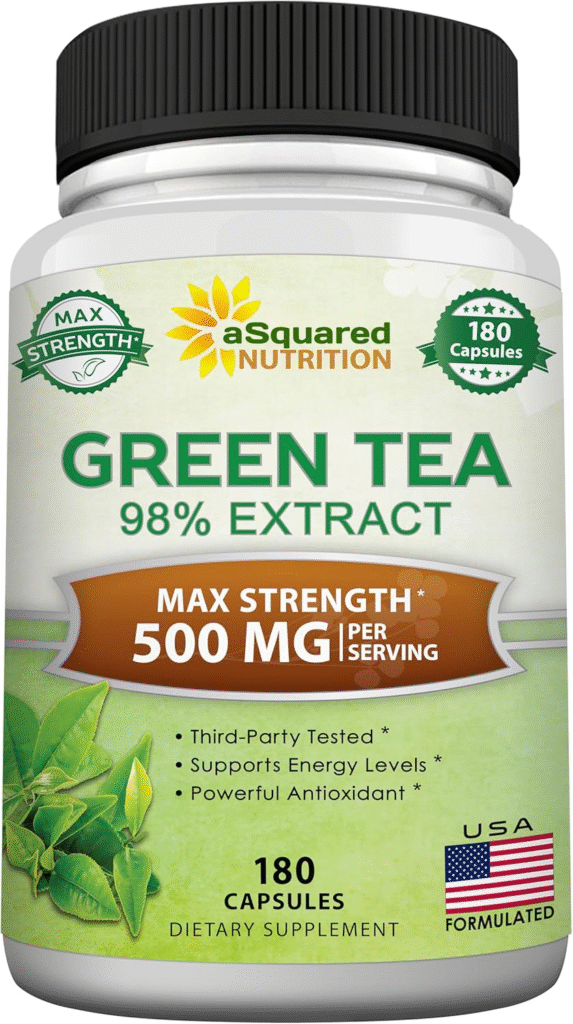
4. Peppermint: Cool Calm for Mind and Body
Peppermint tea is renowned for its ability to soothe digestive issues, but its benefits extend to anxiety relief as well. The menthol in peppermint has a natural muscle-relaxing effect, which can help ease physical tension associated with anxiety.
A study in the International Journal of Neuroscience found that the aroma of peppermint was associated with reduced anxiety and fatigue. While this study focused on the scent, drinking peppermint tea allows you to benefit from both its aroma and its internal effects.
Peppermint tea is also naturally caffeine-free, making it an excellent choice for evening relaxation. I find it particularly helpful when anxiety is accompanied by digestive discomfort, as it can address both issues simultaneously.
The cooling sensation of peppermint can be especially soothing during times of stress or when you’re feeling overheated and overwhelmed. It can help create a sense of calm and clarity, making it easier to face challenging situations.
To brew the perfect cup of peppermint tea, use fresh or dried peppermint leaves and steep them in hot water for about 5-7 minutes. You can adjust the steeping time to your taste preferences – a longer steep will result in a stronger, more minty flavor.
For an extra refreshing twist, try making iced peppermint tea. Brew a strong batch of peppermint tea, let it cool, and serve over ice.
This can be a great option for hot summer days when you need a cooling, calming beverage.
Peppermint tea can also be combined with other herbs for added benefits. For example, a blend of peppermint and chamomile can provide both the digestive benefits of peppermint and the sleep-promoting effects of chamomile, making it an excellent choice for a pre-bedtime drink.
Recommended Product:
Twinings Pure Peppermint Herbal Tea – This is a refreshing herbal tea expertly blended using only pure peppermint to deliver an invigorating tea with an uplifting aroma and fresh mint taste; Naturally Caffeine Free Herbal, 100 Tea Bags.
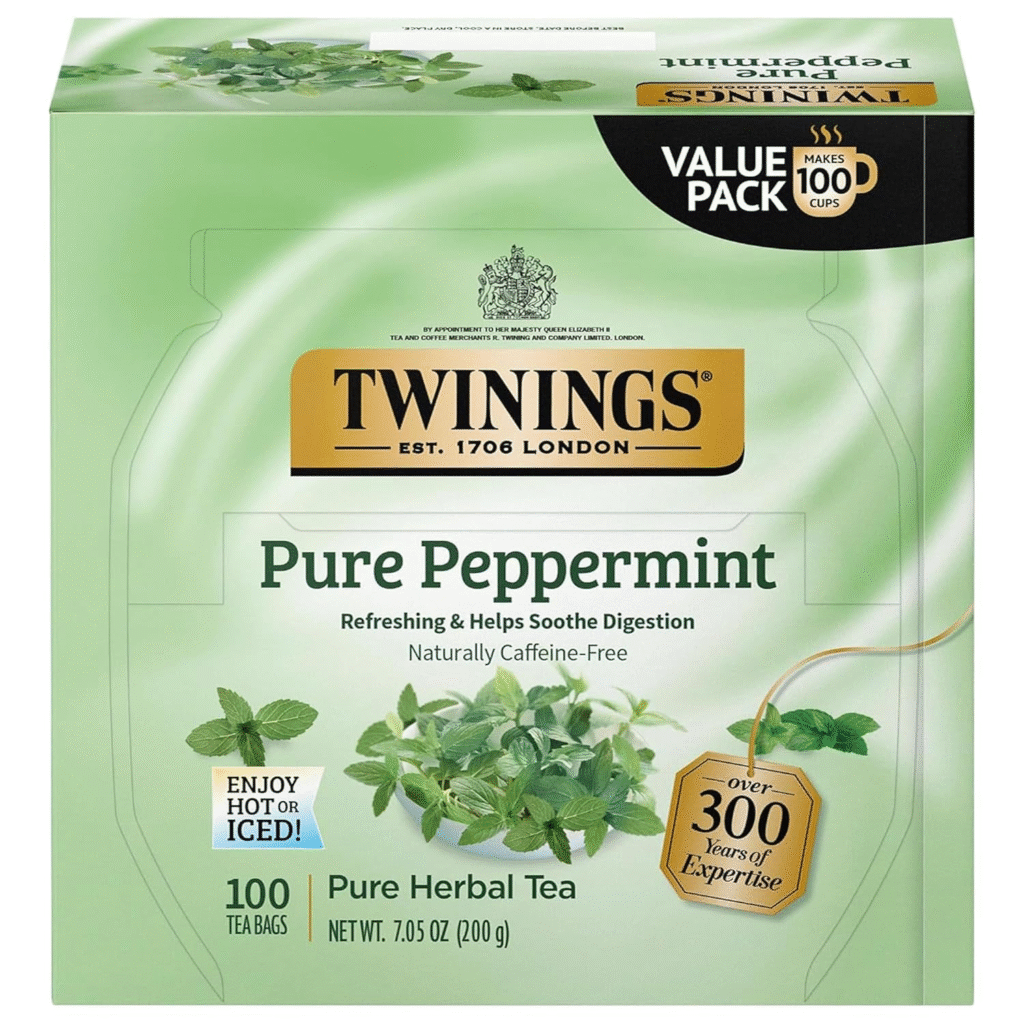
5. Lemon Balm: The Overlooked Anxiety Alleviator
Lemon balm, a member of the mint family, has been used for centuries to reduce stress and anxiety. Its mild lemon flavor is refreshing, and its effects on the nervous system are impressive.
A study published in the journal Nutrients found that participants who consumed lemon balm experienced significant increases in self-rated calmness and decreases in self-rated anxiety. The researchers attributed this effect to lemon balm’s interaction with GABA receptors in the brain.
Lemon balm contains compounds called terpenes, which are responsible for its calming effects. These terpenes have been shown to inhibit the breakdown of GABA in the brain, leading to increased levels of this calming neurotransmitter.
To prepare lemon balm tea, steep 1-2 teaspoons of dried lemon balm leaves in hot water for about 5-10 minutes. The resulting tea has a light, lemony flavor that can be enjoyed on its own or combined with other calming herbs like chamomile or lavender for a synergistic effect.
I like to add a slice of fresh lemon to enhance its citrusy notes and boost its vitamin C content. This improves the flavor and adds an extra nutritional boost to your calming cup of tea.
Lemon balm tea can be particularly helpful during times of mental fatigue or when you’re feeling overwhelmed by work or daily stressors. Its refreshing taste and calming effects can help clear your mind and improve your mood, making it easier to tackle challenging tasks.
For those who struggle with anxiety-related sleep issues, lemon balm can be a valuable addition to your evening routine. Its mild sedative effects can help promote relaxation and improve sleep quality without causing grogginess the next day.
Recommended Product:
HERBAMAMA Lemon Balm Tincture – Herbamama Lemon Balm tincture features a simple formula with just three ingredients: lemon balm extract, vegetable glycerin, and distilled water. It’s vegetarian, with an easy-to-digest formula and no artificial additives. Each drop of Herbamama’s Lemon Balm supplement is carefully crafted to support your calmness. Our pure Melissa Lemon Balm drops provide calm support, ensuring overall relaxation.
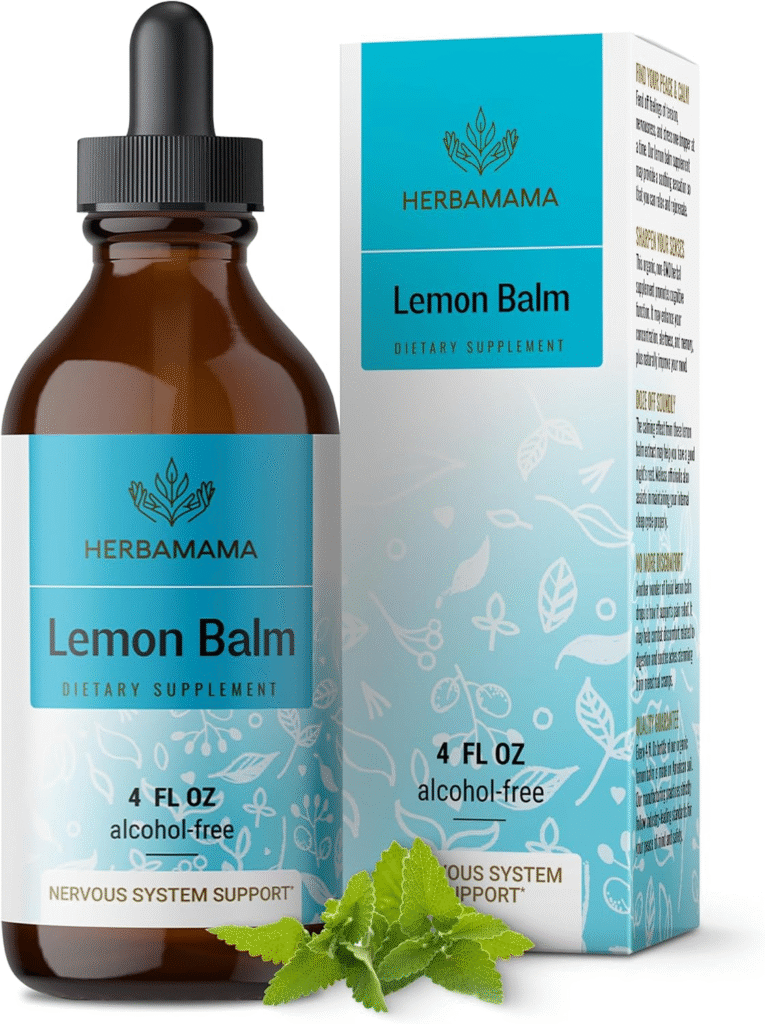
Brewing Tips for Maximum Benefit
To get the most out of your calming teas, consider these brewing tips:
- Use fresh, high-quality tea leaves or bags.
The quality of your tea can significantly impact its flavor and therapeutic benefits.
- Pay attention to water temperature and steeping time for each type of tea.
Green and white teas generally need lower temperatures and shorter steeping times, while herbal teas can often be steeped for longer periods.
- Consider using a tea infuser or strainer for loose leaf teas.
This allows the leaves to fully expand and release their useful compounds.
- Create a calming ritual around your tea preparation and consumption.
Take time to inhale the aroma and sip mindfully, focusing on the sensory experience.
- Experiment with blending different calming teas to create your own unique combinations.
For example, a mix of chamomile and lavender can provide a double dose of relaxation.
- If you prefer sweetened tea, opt for natural sweeteners like honey or stevia, which can complement the flavors of the tea without adding unnecessary refined sugars.
- Consider brewing a larger batch of tea and storing it in the refrigerator for a refreshing, calming iced tea option during warmer months.
Incorporating Calming Teas into Your Routine
Calming teas are most effective when incorporated into a holistic approach to mental health. Consider creating a bedtime routine that includes a cup of chamomile or lavender tea, or start your day with a mindful cup of green tea to set a calm tone for the hours ahead.
Here are some ways to make calming teas a regular part of your anxiety management strategy:
- Morning Ritual: Begin your day with a cup of green tea.
The L-theanine content can help you start your day with a sense of calm focus.
- Mid-Day Break: Take a few minutes in the afternoon to brew and enjoy a cup of peppermint or lemon balm tea.
This can help reset your mind and reduce stress during busy workdays.
- Evening Wind-Down: Make a cup of chamomile or lavender tea part of your bedtime routine.
The act of preparing and sipping the tea can signal to your body that it’s time to relax and prepare for sleep.
- Stress-Response Tool: Keep some calming tea bags in your bag or at your desk.
When you feel anxiety rising, take a moment to brew a cup of tea and practice some deep breathing exercises.
- Social Anxiety Support: If social situations make you anxious, consider suggesting a tea shop as a meeting place.
The act of focusing on choosing and enjoying a calming tea can help ease social tension.
Remember that consistency is key. Regular consumption of these teas, combined with other stress-management techniques like exercise, meditation, and adequate sleep, can lead to significant improvements in anxiety symptoms over time.
A Word of Caution
While these teas are generally safe for most people, it’s important to be aware of potential interactions with medications or existing health conditions. For example, green tea’s caffeine content may not be suitable for everyone, and some herbs can interact with blood thinners or sedatives.
If you’re taking any medications or have any health concerns, it’s always best to ask with a healthcare professional before adding new herbal teas to your routine. They can provide personalized advice based on your specific situation and help you incorporate calming teas into your anxiety management plan safely and effectively.
Additionally, while these teas can be powerful tools for managing anxiety, they should not be seen as a replacement for professional mental health care. If you’re struggling with severe or persistent anxiety, it’s important to seek help from a qualified mental health professional.
Key Takeaways
- Chamomile tea contains apigenin, which may help reduce anxiety and improve sleep.
- Lavender tea can have calming effects similar to anti-anxiety medications.
- Green tea’s L-theanine promotes relaxation without drowsiness.
- Peppermint tea can help relax muscles and ease anxiety-related digestive issues.
- Lemon balm tea has been shown to increase calmness and decrease anxiety.
Frequently Asked Questions
What is the best tea for anxiety?
While person responses may vary, chamomile tea is often considered one of the best teas for anxiety because of its long history of use and scientific backing. However, green tea, lavender, peppermint, and lemon balm are also excellent options.
How quickly can tea help reduce anxiety symptoms?
The effects of calming teas can often be felt within 30 minutes to an hour after consumption. However, for best results, regular consumption over several weeks is recommended.
Can I drink these teas if I’m pregnant?
Some herbal teas may not be suitable during pregnancy. It’s always best to ask with your healthcare provider before consuming any herbal teas while pregnant or breastfeeding.
Are there any side effects of drinking calming teas?
Most calming teas are generally safe when consumed in moderation. However, some people may experience mild side effects such as drowsiness or upset stomach.
If you experience any adverse reactions, stop use and ask a healthcare professional.
How many cups of calming tea should I drink per day?
There’s no one-size-fits-all answer, but most studies on the benefits of these teas have used dosages equivalent to 1-3 cups per day. Start with one cup and adjust based on your personal response and preferences.
Can calming teas replace anxiety medication?
While calming teas can be a helpful addition to an anxiety management plan, they should not be used as a replacement for prescribed medications without consulting a healthcare professional.
Does green tea increase anxiety because of its caffeine content?
While green tea does contain caffeine, it also contains L-theanine, which can help balance the stimulating effects of caffeine. Many people find that green tea provides a calm alertness as opposed to the jitters associated with other caffeinated beverages.
Can I mix different calming teas together?
Yes, mixing different calming teas can be a great way to mix their benefits and create new flavor profiles. However, start with small amounts to ensure you don’t experience any adverse reactions to the combination.
How long should I steep herbal teas for anxiety relief?
Steeping times can vary depending on the specific herb and personal taste preferences. Generally, 5-10 minutes is sufficient for most herbal teas to release their useful compounds.
Are loose leaf teas more effective than tea bags for anxiety relief?
Loose leaf teas often contain higher quality leaves and may provide more potent effects. However, high-quality tea bags can also be effective.
The most important factor is the freshness and quality of the tea, regardless of its form.
Disclaimer
The information contained in this post is for general information purposes only. The information is provided by Top 5 Calming Teas to Soothe Anxiety and while we endeavor to keep the information up to date and correct, we make no representations or warranties of any kind, express or implied, about the completeness, accuracy, reliability, suitability or availability with respect to the website or the information, products, services, or related graphics contained on the post for any purpose.
